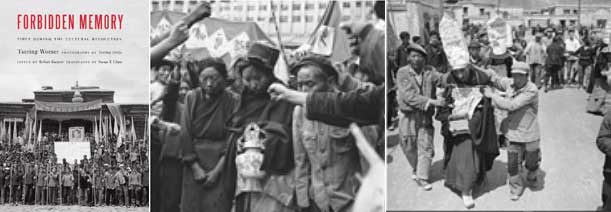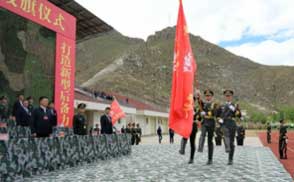The Tibet Autonomous Region recently issued regulations encouraging Tibetans to spy on each other and on foreigners in the name of China’s national security.
The regulations, which tie into Chinese General Secretary Xi Jinping’s “Overall National Security Outlook,” are further proof that the Chinese Communist Party has given up on co-opting Tibetans and is now focused on coercing and silencing them to maintain political control. Although China has coerced Tibetans to spy on each other for decades, the regulations openly acknowledge and approve of the practice.
The “Regulations on counter-espionage Security of the Tibet Autonomous Region”, which came into force on Jan. 1, 2021, are the regional-level regulation in accordance with the national Counter-espionage Law of the People’s Republic of China (2014), the Detailed Rules for the implementation of the Counter-espionage Law of the People’s Republic of China (2017), National Intelligence Law of the People’s Republic of China (2017) and the National Security Law of the People’s Republic of China (2015).
Many of the 32 provisions in the regulations for the TAR—which spans about half of Tibet, a historically independent country that China has occupied for more than 60 years—reaffirm the provisions in the national “counter-espionage law.” When compared to other Chinese provincial “counter-espionage regulations,” certain provisions in the regulations for the TAR stand out for their connection to Beijing’s biased policies for Tibetans. For example, “counter-espionage” in the TAR includes activities such as “ethnic secession,” “ethnic dispute,” and “using religion to endanger national security” (Article 1 and 2).
Deceptive language
Chinese leaders’ strategic and deceptive use of language to cloak repressive policies is well documented in its domestic and international public relations. Evoking counter-espionage to drive people to spy on each other and report to the authorities is one example of this deceptive use of language. Translated interchangeably as counter-espionage or anti-espionage, the political term Fǎn jiàndié (jiàndié meaning “spy” in English and Fǎn equivalent to “counter” or “oppose” in English) connotes a defensive posture, but Fǎn jiàndié in reality is highly offensive and invasive. While the TAR counter-espionage regulations suggests that the party-state is merely reacting defensively to Tibetans threatening China’s stability and unity, both the national and local level “counter-espionage” regulations legally obligate everyone to be proactive and offensive in spying on each other and reporting to the authorities.
In response to a query by the International Campaign for Tibet on his reaction to the TAR Counter-espionage Law and the definition of “espionage” therein, former law lecturer at Peking University and Chinese legal activist Wang Tiancheng said:
“[T]he Counter-espionage Law gives security authorities arbitrary powers to handle all kinds of activities which they perceive as endangering national security including espionage. Their exercise of powers, including wiretapping, opening investigations, making detentions and arrests, and carrying out pre-trials, is not subject to judicial review.
The law and regulations do not provide for any mechanism to check the exercise of their powers. The Counter-Espionage Law treats espionage as one of activities which endanger national security and lists five types of espionage conduct [Article 38.1]. However, it does not define espionage in a way so that one can easily tell the difference between espionage and other types of conduct endangering national security.
It’s widely known that the Communist government uses the charge of endangering national security to cover up the persecutions of human rights and pro-democracy activists. With Tibet Autonomous Region’s introduction of the implementing regulations of the Counter-Espionage Law, it is more likely than before that a person will be charged of conducting espionage or other crimes of endangering national security if he or she collects local information about human rights abuses and passes the information to organizations outside of China. It is also more likely than before that a foreign visitor to Tibet will be charged of conducting espionage or endangering China’s national security if he or she is interested in collecting information about human rights situations or meeting with sensitive persons.”

Wang Tiancheng (Photo: University of Pennsylvania Carey Law School)
Circular logic
Tibetans under Beijing’s rule are often required to report fellow Tibetans to the authorities as a test of their loyalty to China’s party-state. Chairman Mao Zedong’s decade-long Cultural Revolution mania was notorious for inciting and coercing Tibetans to spy on each other and report to party leaders to prove themselves as anti-bourgeoisie or to save themselves from the red guards’ sheer naked political violence. The new TAR regulations on counter-espionage provide for commendation and rewards for Tibetans who perform their legal obligations well in reporting fellow Tibetans (Article 8). Although reward of safety from the disbanded red guards is no longer an incentive, rewards in contemporary Tibet come in the form of access to jobs in the subsidized state sector, a ceremonial career in government or safety from harassment by law enforcement officers.

Forbidden Memory by public intellectual Tsering Woeser chronicles the political violence of the Cultural Revolution in 300 previously unseen pictures.
Through counter-espionage work, the party elite seek to mobilize the masses’ to support the mass line (qunchong luxian) of counter-espionage (Article 3). Mass line is a concept developed by Mao on his idea that the party can aggregate the interests of the people and persist in representing them and working on their behalf. The regulations purportedly strengthen the construction of national security and civil defense under the party and local government’s leadership by mobilizing the whole of society—citizens, communal organizations, enterprises, institutions, social organizations—to counter espionage (Article 2). The concept of mass line uses circular reasoning: The ruling party rules because, by definition, it is the incarnation of the will of the masses, yet the masses must be instructed what to think, through “public opinion guidance,” to ensure they support the mass line.
Chapter II on “Responsibilities and Obligations” (Articles 10-22) heavily emphasizes the state security organs’ powers for security work and military-civilian integration for “counter espionage.” While the state security organs are empowered to penetrate security work throughout society, Tibetans’ obligations as citizens of the People’s Republic of China to conduct “counter espionage” are stipulated in articles 15, 17 and 18. For example, Article 18 stipulates that “citizens and organizations discovering espionage activities or clues shall promptly report to the state security organs or public security organs and other relevant organs.”
Pressure without escape
Pressure on individual Tibetans to report on their neighbors is intensified by the widespread use of surveillance technologies. If cameras and facial recognition algorithms pick up activity deemed suspicious, those who witnessed it, yet failed to report it, also fall under suspicion, and may face interrogation at length.
Especially vulnerable are those who have official dossiers alleging past “bad behavior.” They are under extra pressure, as one condition of release from detention is to report on their neighbors or face a return to prison.
For such Tibetans, the pressure is intolerable, since everyone in a Tibetan urban neighborhood knows this is standard practice, and so they tend to steer clear of those targeted by this unrelenting pressure to report. Those who have had troubling encounters with law enforcement are therefore ostracized by their own community and remain under intense pressure to deliver counter-intelligence.
Until recently the last remaining option for people excluded from Tibetan society and under pressure to spy was to flee abroad, but that option is now almost impossible.
In addition to imprisoning and shooting down fleeing Tibetans, Chinese security agencies have also employed the softer tactic of incentivizing border area Tibetans with monetary rewards for reporting on escaping Tibetans. The tightening of such measures after the 2008 uprising in Tibet drastically curbed the exodus of fleeing Tibetans and, with that, their stories of living under the party’s rule. Prior to 2008, the annual exodus of Tibetans averaged around 2,500. The figures have dropped dramatically since then. Only 18 Tibetan refugees were able to escape in 2019, according to sources in the Central Tibetan Administration who monitor such affairs.
Civilian frontline
With the Tibet Autonomous Region sharing borders with multiple Asian countries—India, Bhutan, Nepal and Myanmar—Chinese authorities use the Tibetan inhabitants of the border areas as a civilian frontline of defense and the focus of military-civilian integration.
The fatal India-China clash along the Ladakh border in June 2020 brought into the spotlight the Chinese authorities’ border security strategies mobilizing border-area Tibetans. While Chinese state media did not explicitly name India, the creation of militias appears to be posturing against India. From the perspective of the CCP leaders, India would mobilize Tibetans towards independence to split the PRC.
The government of the TAR is tasked to strengthen military-civilian integration, military-civilian public security cooperation and border and civil defense integration, and to consolidate military-political military civilian integration (Article 9). Since Xi Jinping has reiterated Mao Zedong’s maxim that the “Party commands the gun” and is above the state and the military, military-civilian integration and formation of a “civil defense line at the border” (Article 11) appears to be a political maneuver to turn Tibetans against Tibetans and against India—which hosts the Dalai Lama and Central Tibetan Administration and where the largest number of Tibetan refugees are settled.

Tibet Military Region launch ceremony for five militia groups in June 2020.
Management and propaganda
The grid-based surveillance system , initially publicized as a way to improve public access to basic services in January 2012, was designed as “nets in the sky and traps on the ground,” in the words of Yu Zhengsheng, then-Standing Committee member of the Politburo of the CCP in February 2013. From the start, grid management was designed primarily for surveillance and control. It is a standard move in the securitization of everything that is now prevalent, justifying the demobilization and disempowerment of Tibetans and their fragmentation under grid management. Grid management is not mentioned in the national-level counter-espionage law nor in the state council’s “detailed implementation of the counter-espionage law.” It is also not specified in counter-espionage regulations for provinces with Chinese-majority residents; for example Jiangsu Province’s regulations on counter-espionage do not mention grid management. Yet it is explicit in the TAR regulations on counter-espionage and also in that of regulations in Sichuan, where Tibetan-inhabited areas are part of the province.
Chapter III of the TAR regulations, titled “Publicity and Education” (Article 23-28), requires propaganda on “counter-espionage” to reach every corner of society. The national security programming of school children must incorporate “counter-espionage” security knowledge into education and teaching content (Article 25). Both print and digital state-controlled mass media and internet service providers are tasked to carry out “counter-espionage” propaganda in the form of advertisements, videos and other propaganda materials (Article 28). Village committees are supposed to be guided to carry out mass “education work” in their villages. In other words, the village committees are tasked with propaganda work within the villages (Article 10 and 23).
Worsening the human rights situation
When asked about the impact of the new TAR counter-espionage regulations on human rights of the Tibetans in Beijing ruled Tibet, eminent Chinese legal scholar Teng Biao told the International Campaign for Tibet:
“[T]he TAR’s counter-espionage security regulation will put ordinary Tibetans in danger. It will set off a wave of political campaigns suppressing free speech and religious freedom. The counter-espionage regulation and its implementation will worsen the human rights situation in Tibet which has been tragic already.”
Teng Biao (Photo: The University of Chicago)


